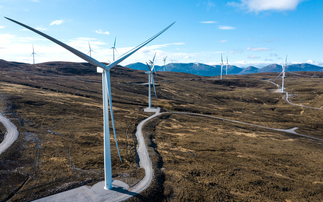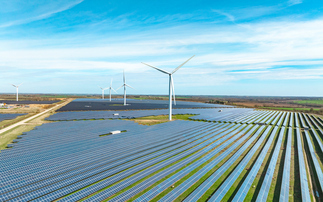What are the main elements of the Paris climate deal and why do they matter for businesses?
The world's superpowers, least developed countries, oil producing nations and small low lying islands, this weekend agreed an unprecedented deal to tackle climate change.
The historic agreement promises to completely reshape the global economy as all nations strive to curb carbon emissions and bolster their climate resilience. The implications for the business community will be epic in their scale and reach, as successive governments seek to deliver a net zero emission economy this century and effectively call time on the era of unabated fossil fuels.
BusinessGreen runs down the key points of the deal, and why they matters to the private sector.
1. The deal aims to keep global warming "well below" 2C and strive towards just 1.5C
This is one of the most ambitious elements of the deal, particularly the reference to 1.5C, which is far stronger than many were expecting.
Achieving 1.5C will be extremely challenging given the world has already seen warming of nearly 1C above industrial levels. Scientists say it would require a rapid scale up of low carbon technologies if we are to stand any chance of meeting the new goal. But the challenge comes with considerable opportunities. According to the International Energy Agency (IEA), achieving temperature increases "well below" 2C above pre-industrial levels will require $16.5tr of investment by 2030, representing a major new market for green businesses.
2. The agreement sets a long-term goal for emissions
The deal states global greenhouse gas emissions should peak as soon as possible and essentially calls for the world to achieve net zero emissions in the second half of this century by achieving a "balance between anthropogenic emissions by sources and removals by sinks of greenhouse gases".
The phrasing may sound arcane, but it is the result of a compromise with those nations that objected to simpler terms such as "net zero emission", "greenhouse gas emission neutrality" or "decarbonisation". However, the more scientific language essentially amounts to the same think, albeit with the door left ajar for greater use of carbon sinks and perhaps even geo-engineering technologies that soak up emissions from the atmosphere.
The target has been one of the most welcome elements of the deal for investors and businesses, as it sends a strong signal that greenhouse gas emissions will head in a downward trajectory throughout this century and they should place their investments accordingly.
Expect to see more blue chips and even smaller businesses setting science-based carbon reduction goals, which take account of their contribution to global carbon emissions and aim for net zero emissions.
3. National climate action plans have been delivered
One of the most promising aspects of the deal actually happened in the months running up to COP21. Nearly 190 countries have submitted their intended nationally determined contributions (INDCs) since March, which set out how they plan to reduce emissions and adapt to rising temperatures.
Any businesses looking to invest in the low carbon economy can use these national actions plans to guide their investment decisions.
Attention will now turn to how those countries that have not transcribed the targets and investments contained into the INDCs into national policies will do so. However, the world's three biggest markets, the US, the EU, and China have already cemented much of their proposed measures in national legislation.
The investment opportunities as more nations attempt to deliver on their INDCs will be enormous.
4. And INDCS will be reviewed every five years
Countries have committed to take stock of their collection action and how this measures up against the long term targets every five years. The current INDC pledges are still expected to deliver warming of around 2.7C, which would be catastrophic for the planet. The first stock take talks are scheduled for 2018, and countries with 2025 targets are urged to update their plans targets by 2020. Those with 2030 targets, such as the European Union have also been invited to provide an update to their INDC.
According to PwC, countries will need to double the rate of reduction in the carbon intensity of their economies to meet the new temperature goals.
But the system of INDC reviews keeps alive hopes this could happen, particularly as governments will be undertaking their reviews against a backdrop where clean energy costs are expected to keep falling. Significantly, the text bans countries from backsliding in their five yearly reviews and it invites those countries with relatively vague INDCs to develop 2050 emissions targets and low carbon emission strategies by 2020.
5. Rich countries will continue to provide climate finance
The issue of funding was a major sticking point of the talks, with the US insisting any commitment could not be legally binding if it wanted to avoid having to seek Congressional approval for the agreement, and large emerging economies such as India rejecting OECD estimates that $62bn of climate finance was mobilised by developed nations last year.
But an agreement was eventually reached, confirming a new financial goal will be agreed in 2025 above the $100bn per year target for 2020 that was agreed in 2009.
The prospect of a steadily increasing sum of international climate finance, coupled with the vast array of private sector climate investments announced in the past two weeks, offers a further boost to clean tech markets around the world.
6. Loss and damage - but not compensation
In a major win for low-lying islands the issue of loss and damage remained in the Paris Agreement, rather than being shunted down into the non-binding COP decision.
The Paris Agreement pledges to strengthen the existing Warsaw International Mechanism on Loss and Damage agreed in 2013, which helps address the financial losses that vulnerable countries incur. But crucially for the EU and US, the deal avoids the words "compensation" or "liability", which they feared could open the door for legal action against them.
The Loss and Damage mechanism is also backed by new commitments to push investment in adaptation and climate resilience up the global agenda, again creating considerable investment opportunities for infrastructure firms.
7. Carbon markets set to expand
Carbon markets have long been opposed by a number of socialist governments in Latin America who object to the concept of using market mechanisms to tackle climate change. However, the Paris Agreement retained a number of clauses that promises to provide a boost to carbon markets, referencing how co-operative action between countries could see them deliver on their carbon targets through market mechanisms and the trading of emissions allowances.
The text also raises the prospect of linkages between existing carbon markets, potentially providing the framework for a truly international system of carbon pricing. The potential benefits for businesses looking for the most cost effective way to cut emissions are obvious.
This article is part of BusinessGreen's Road to Paris hub, hosted in association with PwC.







